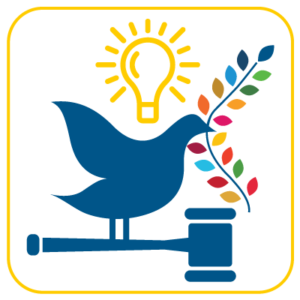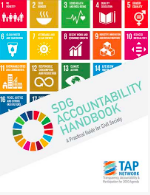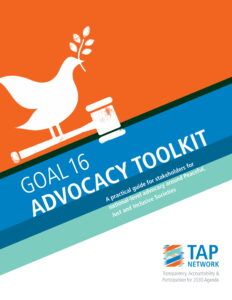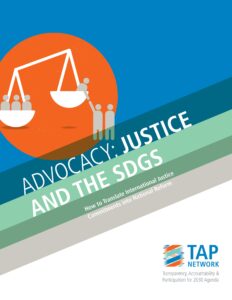Law reform is essential in order to achieve some of the SDG16+ targets and to create an enabling environment that supports overall SDG16+ implementation
Law reform (or legal reform) is the process of analyzing current laws and advocating for and carrying out changes to them, usually with the aim of enhancing justice or efficiency. There are four main methods of reforming the law: (a) repeal (removal or reversal of a law); (b) creation of new law; (c) consolidation (combination of several laws into one); and (d) codification (collection and systematic arrangement, usually by subject, of the laws of a state or country).
Law reform is essential in order to achieve specific SDG16+ targets such as targets 10.3 and 16.b, which explicitly call for law reform.1 Depending on the country, law reform may also be needed to repeal discriminatory laws against women and girls (SDG target 5.1), prosecute human and child trafficking (SDG targets 8.7 and 16.2), protect labour rights (SDG target 8.8), prosecute bribery and corruption (SDG target 16.5) and ensure freedom of information (SDG target 16.10). Law reform is also essential to create an enabling legal framework and environment to support overall SDG16+ implementation. For example, law reform can be used to ensure that non-governmental stakeholders can provide input into public policies and laws related to peace, justice and inclusion. It can also be used to ensure that there is transparency in government decision-making processes and budget allocations related to SDG16+ implementation.
The process for law reform will vary from country to country. In some cases, law reform will be led by the executive branch of government. In other cases, members of the parliament or legislature will have the power to propose laws, either due to the legislature’s own law-making powers or through a private members’ bill. In most countries, once a draft law is tabled for consideration by the legislature, it will be referred to a specific legislative committee for review.2 As part of its review process, a legislative committee may organize public hearings or consultations to allow civil society and other stakeholders to provide feedback on the draft law before it is revised and presented in the legislature for final approval and adoption.

TIP: 

TIP:
Anti-discrimination acts, bills of rights and constitutional protections for certain groups can often be used as a basis to challenge and reform discriminatory laws.
a. Determine how the law-making process works and which body within the government or legislature is responsible for actually drafting laws. Often, one ministry will be responsible for a particular SDG16+ issue, while another ministry will be responsible for legislative drafting; in such cases, it is important to work with both ministries;
b. Educate and lobby key ministers, legislators and other government officials on why law reform is needed in relation to your SDG16+ issue;
c. Offer technical advice or support to the ministry, legislator or office responsible for legislative drafting to develop a proposal for law reform. Support may include providing research and analysis of proposed laws, or providing a draft law or model laws from other jurisdictions, which can be adapted to your local context;
d. Offer practical support to the ministry, legislator or office responsible for legislative drafting to undertake or facilitate public consultations to inform the draft law; and
e. Once a draft law is tabled in the legislature for consideration, participate in any public hearings or consultations on the law by making oral or written submissions to the relevant legislative committee.
TIP: Engaging in law reform to advance peaceful, just and inclusive societies 

TIP: Engaging in law reform to advance peaceful, just and inclusive societies
Legal empowerment
Legal empowerment enables people to know, use and shape the law in order to secure justice. It is about strengthening the capacity of all people to exercise their rights – either as individuals or as members of a community – and ensuring that the law is available and meaningful to citizens. Legal empowerment places the power of the law in the hands of the people.5
Approaches to legal empowerment include legal education, information, advocacy, organizing and mediation. It is often promoted by a frontline community of paralegals who are trained to assist citizens in finding concrete solutions to their justice-related problems. These approaches engage the grassroots level, which is especially important for SDG16+ implementation. They focus not only on achieving a just outcome, but also, crucially, on enabling people to engage in law-related processes. Legal empowerment practitioners do not say, “I will solve this problem for you,” but rather, “I will work with you to solve this problem and give you the knowledge and tools you need to address such problems in the future.”6
Case Study


Case Study
Accelerating Action to Strengthen Afghanistan’s Legal Aid System
International Legal Foundation
In partnership with the International Legal Foundation (ILF), Afghanistan is seeking to build a more effective and sustainable legal aid system. The partnership will center on implementing Afghanistan’s 2019 Legal Aid Regulation, which provides a roadmap for transforming the current system by increasing its independence, capacity to monitor and evaluate the quality of legal aid services and ability to expand services nationwide. These steps align with Afghanistan’s public commitment to accelerate action on SDG 16.
In March 2020, the Ministry of Justice made a firm commitment to strengthen rule of law by ensuring that quality criminal defense is accessible to everyone in Afghanistan. Justice in Afghanistan has made significant progress since 2001 through the creation of a modern court system and the training of an entire generation of legal professionals. However, with over half of Afghans living in poverty, the country continues to face major challenges. Although Afghanistan’s Constitution guarantees the right to counsel for anyone accused of a crime and the country has a state-sponsored legal aid system, in practice, few poor people have access to lawyers with the skill to defend them effectively. This puts suspects and defendants at risk of arbitrary detention, torture, coercion, wrongful convictions and other abuses.
In collaboration with the ILF, the Ministry of Justice is committed not only to expand the reach of legal aid, but to guarantee access to quality legal services. The ILF will provide technical assistance, working closely with the Ministry of Justice to share international standards and best practices in legal aid system management and delivery. The partnership focuses on implementing Afghanistan’s 2019 Legal Aid Regulation and strengthening the Ministry of Justice Legal Aid Department, including by:
Afghanistan’s Ministry of Justice and the ILF doubled down on their efforts to achieve SDG 16 with an acceleration action submitted to the United Nations. The action highlights their commitment to developing a comprehensive legal aid system that is accessible, effective, sustainable and credible across Afghanistan. Both parties also concluded a formal memorandum of understanding outlining their plans in March 2020.
Key Take-aways: The ILF’s 15+ years of on-the-ground experience, relationships with key Ministries and justice leaders, and ability to secure resources to launch implementation drove the execution and success of this partnership.
SDG Accountability Handbook: A Practical Guide for Civil Society (TAP Network, 2018)
This handbook provides guidance on the different approaches and steps that can be taken by civil society to ensure national government accountability for the SDGs. It includes a chapter on ‘Pursuing Law Reforms, Strategic Litigation and Legal Empowerment.’ Available at: https://sdgaccountability.org/

Goal 16 Advocacy Toolkit: A practical guide for stakeholders for national-level advocacy around Peaceful, Just and Inclusive Societies (TAP Network, 2016)
This toolkit provides civil society and other non-governmental stakeholders with guidance on how to engage with their governments and other local, regional or international stakeholders to support the planning, implementation, follow-up and accountability of SDG 16. It includes a section on ‘Participating in Law Reform.’ Available at: https://tapnetwork2030.org/goal-16-advocacy-toolkit/

Advocacy: Justice and the SDGs, How to Translate International Justice Commitments into National Reform (TAP Network, 2015)
This toolkit – aimed at civil society, activists and policy practitioners who are working to promote legal empowerment and access to justice – provides a step-by-step guide on how to create a national justice plan. Available at: https://tapnetwork2030.org/wp-content/uploads/2015/04/TAP_Advocacy_JusticeandtheSDGs.pdf

This global initiative – launched by a consortium of international law firms – seeks to help developing countries undertake law reforms aimed at enabling effective implementation of the SDGs through their national action plans.
Available at: https://www.leeg-net.org/sdgs-enabling-law-reform-drive
Convened by Namati, the Legal Empowerment Network is the largest community of grassroots justice defenders in the world. It brings together more than 2,400 organizations and 9,000 individuals from over 160 countries, all working to advance justice for all. Membership is open to those who help others to know, use or shape the law.
Available at: https://namati.org/network/
Transparency, Accountability &
Participation (TAP) Network
Address: 205 E 42nd St.
New York, NY 10017
Email:
[email protected]